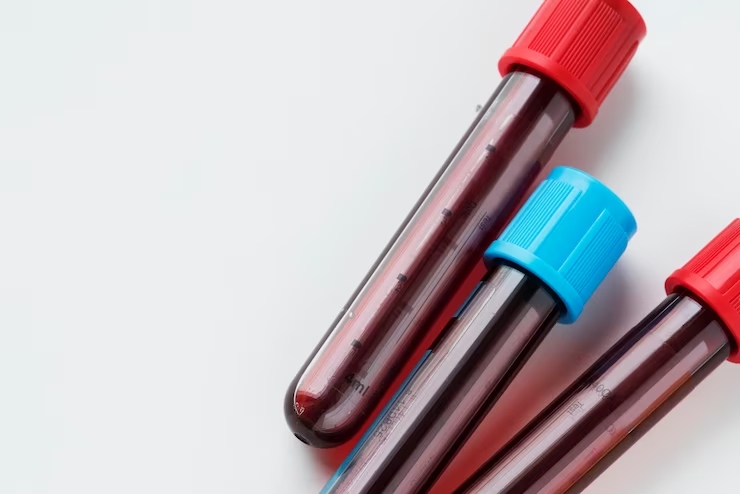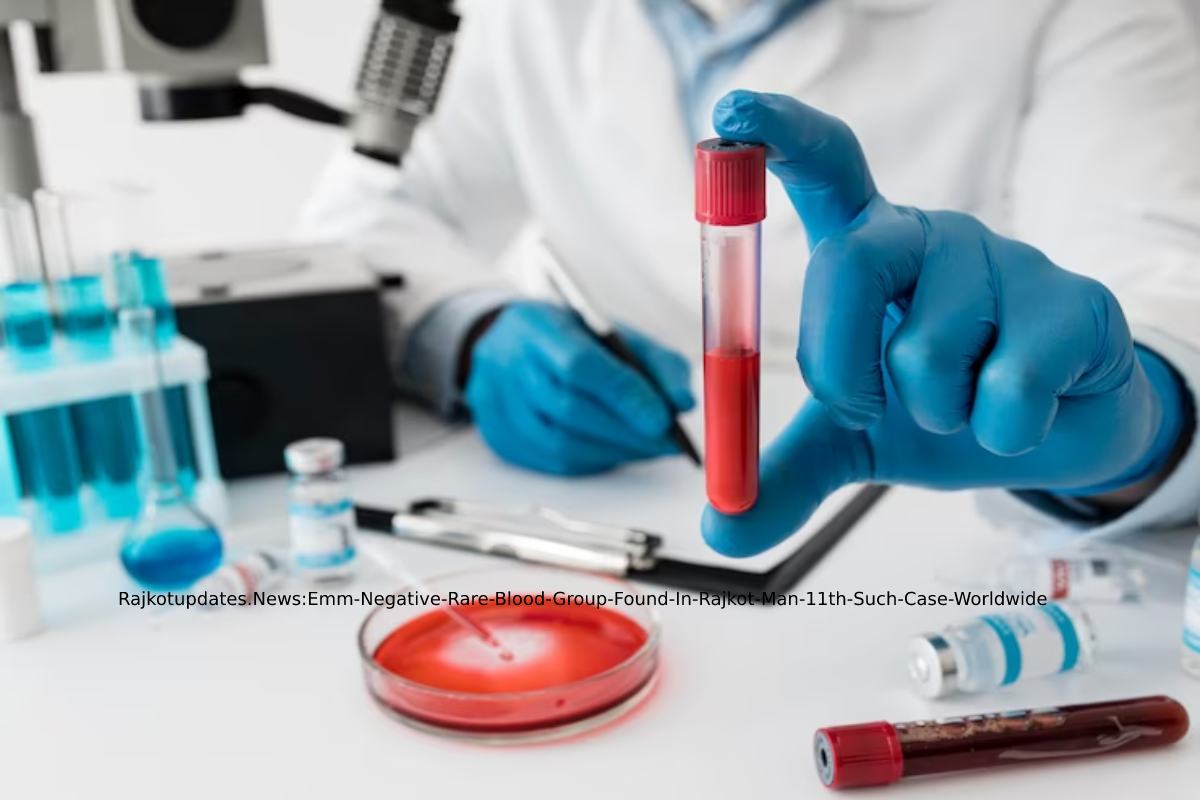Yes, I am aware of the article you are referring to. A 65-year-old man from Rajkot, Gujarat, India, was found to have a rare blood type called EMM negative. It is the 11th known case of this blood type in the world.
EMM negative is a blood type incompatible with the other four major blood types (A, B, O, and AB). It means that people with EMM negative blood can only receive blood from other people with EMM negative blood. rajkotupdates.news:emm-negative-rare-blood-group-found-in-rajkot-man-11th-such-case-worldwide
The man in Rajkot needed a blood transfusion for a cardiac surgery. However, his blood type was incompatible with any of the blood available at the blood bank. As a result, he had to wait for a blood donation from someone with EMM-negative blood.
Fortunately, a blood donation and the man could undergo his surgery. He is now recovering well.
The discovery of this rare blood type is a reminder of the importance of blood donation. If you can donate blood, please do so. You could save a life. Explore other aspects of rajkotupdates.news:emm-negative-rare-blood-group-found-in-rajkot-man-11th-such-case-worldwide.
Table of Contents
Here Are Some Additional Information About EMM Negative Blood Type: rajkotupdates.news:emm-negative-rare-blood-group-found-in-rajkot-man-11th-such-case-worldwide
It is a very rare blood type. There are only about 11 known cases of EMM negative blood worldwide.
People with EMM negative blood can only receive blood from others with EMM negative blood.
There is no way to create EMM negative blood in a laboratory.
The only way to get EMM negative blood is through blood donation.
If you want to donate blood, please visit your local blood bank. You can also find more information about blood donation on the website of the American Red Cross.
Association Of ABO Blood Group With COVID-19 Severity, Acute Phase Reactants And Mortality

Evidence suggests that ABO blood group may be associated with COVID-19 severity, acute phase reactants, and mortality.
A study published in the journal PLOS One in 2021 found that people with blood group A were more likely to develop severe COVID-19 than people with blood group O. The study also found that people with blood group A had higher levels of inflammatory markers, such as C-reactive protein (CRP), than people with blood group O.
Another study, published in Blood in 2022, found that people with blood group A were more likely to die from COVID-19 than those with blood group O. The study also found that people with blood group A had higher antibodies to the SARS-CoV-2 virus than those with blood group O.
However, it is important to note that these studies are observational, which means they cannot prove that ABO blood group is a cause of COVID-19 severity, acute phase reactants, or mortality. Therefore, more research is needed to confirm these findings. rajkotupdates.news:emm-negative-rare-blood-group-found-in-rajkot-man-11th-such-case-worldwide
In the meantime, people with blood group A should take the same precautions as everyone else to protect themselves from COVID-19, such as getting vaccinated, wearing a mask, and social distancing.
Why Is The Rarest Blood Group In The World Named After ‘Bombay’? Here’s The Answer
The Bombay blood group is a rare blood type first discovered in Bombay, India, in 1952. It is also known as the Oh blood group. People with the Bombay blood group do not have the H antigen on their red blood cells. The H antigen is a precursor to the A and B antigens, the two main antigens determining blood type. As a result, people with the Bombay blood group can only receive blood from other people with the Bombay blood group.
A mutation in the H gene causes the Bombay blood group. The H gene is responsible for the production of the H antigen. People with the Bombay blood group have a mutation in the H gene that prevents the production of the H antigen.
The Bombay blood group is very rare. It esestimated that only in 10,000 people inworldwide The Bombay blood group is most common in India, Pakistan, and Bangladesh.
The Bombay blood group is named after Bombay, India, because it was first discover there. Dr. Y. M. Bhende, a hematologist at the King Edward Memorial Hospital in Bombay, discovered the Bombay blood group. Dr. Bhende was studying a patient who needed a blood transfusion. The patient’s blood type could not be determined using the standard blood typing methods. Dr. Bhende conducted further tests and discovered that the patient had the Bombay blood group. rajkotupdates.news:emm-negative-rare-blood-group-found-in-rajkot-man-11th-such-case-worldwide
The discovery of the Bombay blood group was a significant event in the field of blood typing. The Bombay blood group is the only blood type incompatible with the four major blood types (A, B, O, and AB). This means that people with the Bombay blood group can only receive blood from other people with the Bombay blood group. The discovery of the Bombay blood group has made it more difficult for people with the Bombay blood group to find a blood donor.
Despite being rare, the Bombay blood group is important to understand. It is a reminder that there are many different blood types and that blood typing is an important part of medical care.
Discussion of rajkotupdates.news:emm-negative-rare-blood-group-found-in-rajkot-man-11th-such-case-worldwide
EMM negative blood is a rare blood type first discovered in India in 2020. It is cause by a mutation in the PIGG gene, which is responsible for producing the EMM antigen. People with EMM negative blood cannot donate or receive blood from anyone else. Instead, they must receive blood from other people with EMM negative blood.
EMM negative blood is the 42nd blood group system and is given the symbol ISBT042. It is the only blood group system incompatible with the four major blood groups (A, B, O, and AB).
As of 2023, only 11 known cases of EMM negative blood worldwide exist. Most cases have been found in India, but there have also been cases reported in the United States, the United Kingdom, and Japan.
The discovery of EMM negative blood is a reminder that there are many different blood types and that blood typing is an important part of medical care.
Discussion of rajkotupdates.news:emm-negative-rare-blood-group-found-in-rajkot-man-11th-such-case-worldwide
The man with the EMM Negative blood group is currently doing well and is recovering from his heart surgery. He is hopeful that his story will help to raise awareness of the rarest blood group in the world.
The article also mentions that the man’s blood type was initially misclassified as AB-positive, which is a common blood type. This misclassification could have had serious consequences, as the man would have been given blood that was not compatible with his blood type. The correct identification of the man’s blood type was only possible through further testing.
The discovery of the EMM Negative blood group is a reminder of the importance of blood donation. People with rare blood types, such as EMM Negative, are often unable to find compatible blood donors. Blood donation is a safe and easy way to help save lives. If you are able to donate blood, please do so. You could help someone who is in desperate need.
FAQs about Rajkotupdates.News:Emm-Negative-Rare-Blood-Group-Found-In-Rajkot-Man-11th-Such-Case-Worldwide
Here are some FAQs about the article “EMM Negative Rare Blood Group Found in Rajkot Man, 11th Such Case Worldwide” from rajkotupdates.news:
What is the EMM Negative blood group?
The EMM Negative blood group is a rare blood type that cannot be categorized into the existing groups of A, B, O, or AB. It is caused by a mutation in the EMM gene, which is responsible for the production of a protein that helps the body fight infection. People with EMM Negative blood group are unable to donate blood to anyone, and they can only receive blood from other people with the same blood group.
How many people in the world have the EMM Negative blood group?
There are only about 10 people in the world who have the EMM Negative blood group. The first person with this blood type was identified in 1961. Since then, only 9 other people have been found to have the same blood type.
What are the symptoms of having the EMM Negative blood group?
People with EMM Negative blood group do not have any symptoms. They are only aware of their blood type if they need a blood transfusion.
How is the EMM Negative blood group diagnosed?
The EMM Negative blood group is diagnosed through a blood test. The blood test looks for the presence of the EMM antigen. People with EMM Negative blood group will have the EMM antigen in their blood.
What are the risks of having the EMM Negative blood group?
The main risk of having the EMM Negative blood group is that people with this blood type may not be able to find compatible blood donors. If a person with EMM Negative blood type needs a blood transfusion, they will need to receive blood from another person with the same blood type. This can be difficult, as there are only a few people in the world with EMM Negative blood group.
